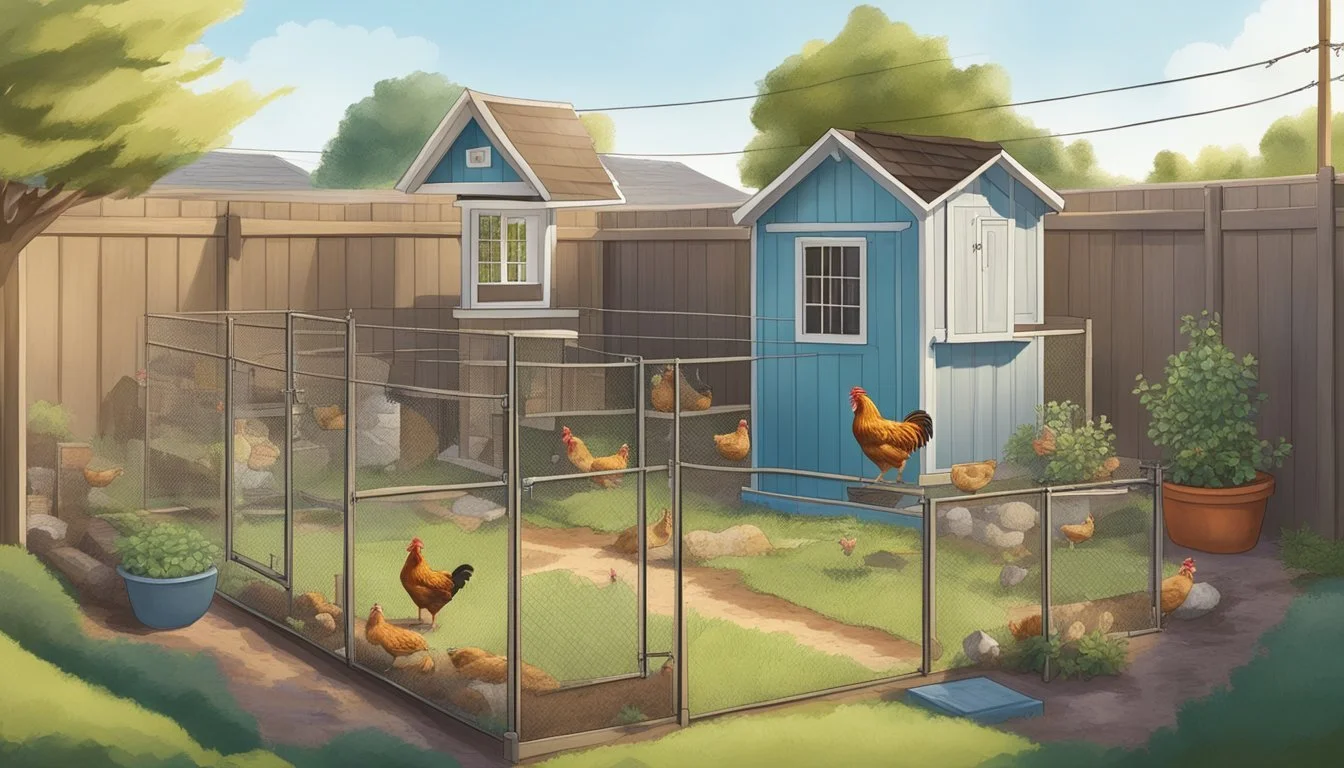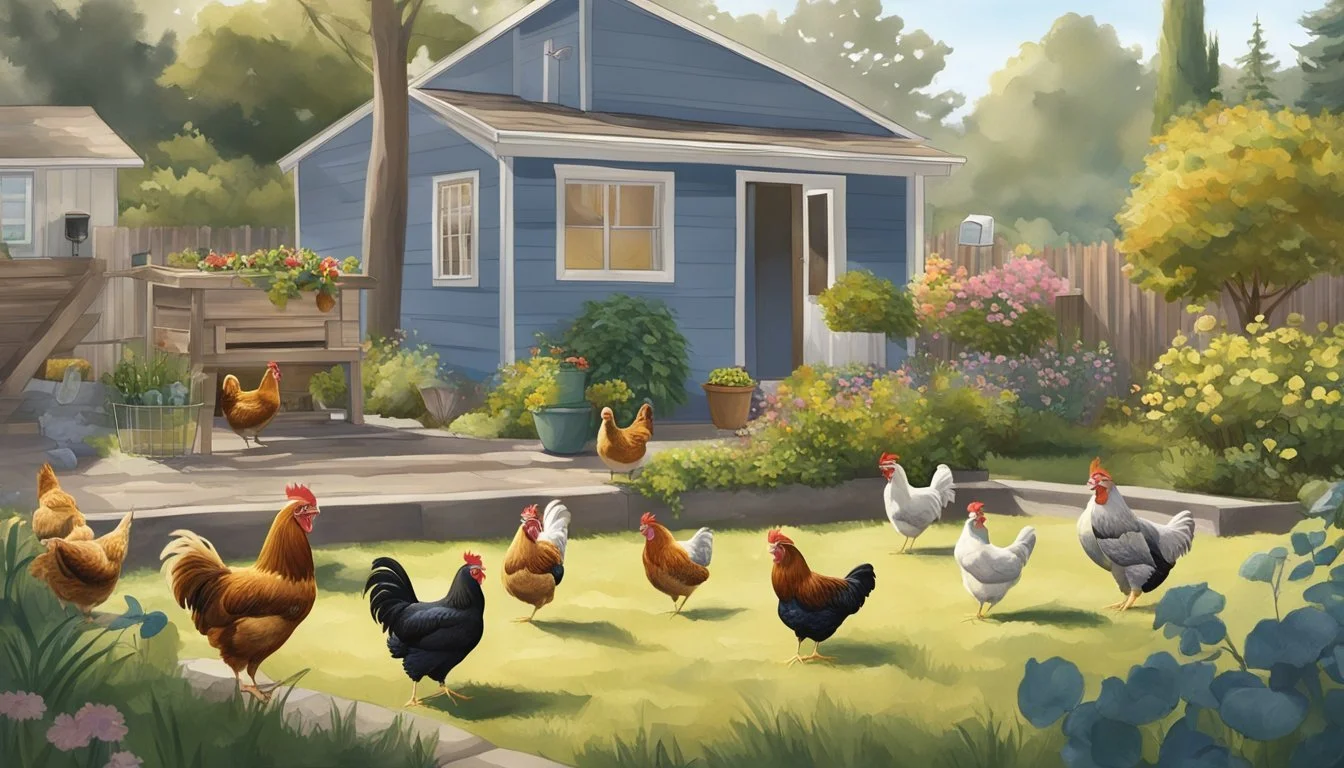Keeping Backyard Chickens in Richmond, CA
Essential Tips for Urban Poultry Farming
Raising backyard chickens has become an increasingly popular practice in suburban and urban areas, offering a way for residents to connect with their food sources and engage in sustainable living. In Richmond, California, those interested in keeping chickens must navigate both state and local regulations designed to ensure the health and safety of the community, as well as the welfare of the chickens. Proper adherence to these guidelines ensures that backyard chicken enthusiasts can maintain their coops in harmony with their neighbors and the city's ecosystem.
In Richmond, the local ordinances dictate specific conditions under which poultry can be kept, often addressing concerns like coop placement, hen number restrictions, and noise control. Prospective poultry keepers are prompted to understand the relevant laws as they prepare their homes for their feathered friends. Access to accurate and up-to-date information on these regulations is crucial for Richmond residents to avoid legal issues and create a thriving environment for their backyard chickens.
Legal Framework in Richmond
In Richmond, California, keeping backyard chickens is regulated by local zoning ordinances and specific municipal codes which address the number of chickens allowed, permit stipulations, and proximity constraints.
Understanding Local Zoning Ordinances
Local zoning ordinances play a critical role in determining whether residents can keep chickens in their backyard. In Richmond, zoning regulations vary based on the specific location within the city limits. These ordinances are designed to maintain the residential character of neighborhoods while balancing agricultural activities. Homeowners should consult the local zoning map to ascertain the zone designation for their property and adhere to the guidelines set forth for that zone.
City-Specific Chicken Regulations
Regulations pertaining to the keeping of chickens within Richmond are spelled out in the municipality’s Municipal Code. Chapter 9, section 24.040 states that the number of animals, including chickens, on any premises should not exceed a "prudent and reasonable number." This typically means that residents in residential areas can keep chickens, but the number of chickens is regulated to avoid issues related to noise, sanitation, and the overall impact on neighboring residences.
Distance Requirements: There are also specified restrictions on how close chicken coops can be located to property lines and neighboring houses.
Sanitation: Residents must maintain cleanliness to prevent odors and pests.
Richmond's local government has the authority to enforce these regulations, and potential chicken owners should familiarize themselves with these before setting up a coop.
Permit Requirements and Process
In some cases, residents may be required to obtain a permit to legally keep chickens in their backyard. The process involves:
Application Submission: Homeowners must submit a detailed application to the local government.
Permit Fee: An accompanying fee may be required depending on the municipality’s policies.
Inspection: A city official might inspect the proposed chicken-keeping area to ensure compliance with local laws.
It's important for residents to understand the permit process to avoid penalties or the need to rehome their chickens. Local ordinances are often updated; therefore, checking for the most current regulations is recommended.
Keeping backyard chickens in Richmond involves navigating a range of local laws and ordinances, with compliance ensuring a harmonious community and a healthy chicken-keeping environment.
Setting Up Your Chicken Coop
When setting up a chicken coop in Richmond, California, it is essential to adhere to local ordinances while ensuring the coop provides safety, comfort, and a clean environment for the chickens.
Choosing the Right Location
The location of a chicken coop must be carefully considered to maintain a balance between accessibility and adherence to legal requirements. In Richmond, the coop should be positioned at least 20 feet away from any window or door to comply with local regulations. This not only helps to prevent noise and odor disturbances but also reduces the risk of disease transmission to humans.
Coop Construction and Features
A well-constructed chicken coop must provide ample space and protection from predators. Each coop must be ventilated but also predator-proof. For the safety of the chickens, doors require secure latches as raccoons and other predators have been known to open doors and invade coops. Construction materials should be durable and provide insulation, while the coop should have a designated space for chickens to roost and lay eggs.
Minimum Space: At least 3 square feet per chicken.
Features: Secure latches, nesting boxes, and roosting bars.
Maintaining a Clean and Healthy Environment
To prevent the accumulation of manure and the associated health risks, it must be managed effectively. Manure should be collected in bins that are secure against flies and other pests and should not be allowed to pile up. The coop and run area should be cleaned regularly to minimize the risk of disease and to provide a pleasant living space for your chickens.
Manure Management: Use fly-free containers for waste.
Health Practices: Regular cleaning of the coop and run.
Daily Chicken Care
Keeping chickens in one's backyard in Richmond, California, requires a diligent care routine to ensure their health and productivity. Homeowners must provide appropriate food, maintain a clean nesting environment, protect their flock from predators, and monitor the birds for signs of disease to prevent any nuisances or health issues.
Feeding and Nutrition
Chickens need to be fed a diet appropriate for their age and purpose. Pullets, for instance, require a feed high in protein to support their growth, while egg-laying hens benefit from a layers feed rich in calcium. Homeowners should ensure that chickens have constant access to clean water and their feeders are kept clean to prevent the food from spoiling.
Feed Type: Select a high-quality, age-appropriate feed.
Water: Provide unlimited access to fresh water.
Nesting and Egg Collection
Nesting boxes should be kept clean and filled with suitable bedding material such as straw or shavings. This encourages hens to lay eggs and helps to keep the eggs clean. Eggs must be collected daily to ensure they are fresh and to discourage the chickens from eating them.
Cleanliness: Regularly remove soiled bedding from nesting boxes.
Egg Collection: Check for eggs every morning as part of the routine.
Protection From Predators
Backyard chickens are at risk from predators like raccoons, possums, and skunks. To keep the flock safe, their coop must be sturdy and secured with predator-proof latches. It's also crucial to examine the coop regularly for any gaps or weak points that could allow a predator to enter.
Coop Security: Inspect and reinforce the coop regularly.
Secure Latching: Use locks or wire clasps that predators cannot open.
Health Monitoring and Disease Prevention
Preventative care is essential to keep chickens healthy and reduce the likelihood of disease. Owners should watch for signs of illness or distress among their birds, such as changes in eating habits or the appearance of their droppings. A clean coop helps prevent the buildup of smell and flies, which can be a nuisance to neighbors and a health hazard to the chickens.
Observation: Daily checks for any signs of unusual behavior.
Sanitation: Routine cleaning to keep the coop odor-free and reduce the chance of disease spread.
Community Relations and Etiquette
When keeping backyard chickens in Richmond, CA, it's important to consider community relations and etiquette. Maintaining a friendly and cooperative relationship with neighbors can help ensure that your chicken-keeping experience is positive for all involved.
Dealing With Noise and Smell
Noise from hens can become a nuisance to neighboring residences. To minimize disturbances:
Restrict the number of hens according to local laws to avoid excessive noise.
Implement sound-proofing measures such as insulation for the coop.
Odor control is equally important. Owners should:
Clean the coop regularly to prevent offensive smells.
Use odor-neutralizing materials like straw or wood chips in bedding.
Neighborly Chicken Practices
Chicken keepers should adhere to regulations set by the city of Richmond and nearby areas including San Francisco, Bakersfield, Long Beach, Oakland, and Sacramento. Practices that promote good neighbor relations include:
Providing adequate space for hens to prevent overcrowding.
Building proper enclosures to contain chickens within the owner's property.
Dispute Resolution
In case of disputes, the following steps should be taken:
Communicate directly with neighbors to address concerns.
Consult the city's regulations regarding backyard chickens if the dispute escalates.
By respecting local laws and maintaining proper practices, chicken keepers can contribute to a harmonious community while enjoying the benefits of raising chickens.
Special Considerations
When raising backyard chickens in Richmond, California, residents must navigate various city ordinances and state laws. These rules govern the keeping of roosters, the process of breeding and raising chicks, and the regulations around slaughtering for personal consumption.
Understanding Roosters in Urban Settings
In Richmond, individuals must be especially mindful of local noise ordinances when keeping roosters. They are known for their crowing, which can be considered a noise disturbance. Chapter 9, section 24.040 of the Richmond Municipal Code implies that owners should keep their poultry populations, including roosters, at a prudent and reasonable number to prevent noise issues.
Breeding and Raising Chicks
Residents interested in breeding chickens need to ensure their practices align with zoning restrictions and sanitation requirements. For those who raise chicks, it is important to maintain clean living conditions to prevent the spread of disease. Proper waste management, such as composting chicken waste, is not just recommended for environmental health but is often a regulatory requirement.
Slaughtering and Consumption Regulations
Slaughtering chickens for personal meat consumption carries its own set of considerations. One must follow humane slaughtering practices and adhere to health and safety ordinances regarding the handling and disposal of waste. While not explicitly mentioned in the search results regarding Richmond, California, urban farmers should check both local and state regulations to ensure compliance.
It is essential for anyone considering raising chickens in Richmond, CA, to review the specific municipal codes and obtain any required permits ahead of initiating these activities.
Resources and Support
Successful chicken keeping in Richmond, CA, hinges on understanding local regulations, accessing quality supplies, and connecting with the chicken keeping community. Resources and support are available to guide both novice and experienced keepers through the process.
Educational Resources and Workshops
Richmond residents can benefit from a variety of educational resources aimed at promoting responsible chicken keeping. Local government agencies and poultry associations often host workshops that cover essential topics such as chicken care, coop construction, and understanding city ordinances. The Richmond Public Library may offer books and materials on poultry care, as well as information on any upcoming local events.
Upcoming Events: Check the library's calendar for workshops on chicken care.
Reading Material: A section dedicated to agriculture and animal husbandry.
Local Chicken Keeping Communities
Community groups play a pivotal role in supporting chicken enthusiasts. They offer a platform for members to share experiences, advice on chicken laws, and best practices for keeping chickens as pets. Richmond’s community gardens and online forums serve as hubs for these interactions.
Online Platforms: Facebook groups or forums specific to Richmond chicken keepers.
Meetups: Regular community gatherings where chicken keepers can connect.
Accessing Supplies and Services
For keepers in need of supplies and services, Richmond's local feed stores and pet supply shops are important resources. They provide a range of products from feed to coop materials, often with staff knowledgeable about chicken care regulations. Additionally, veterinary services for poultry are crucial and can often be found through recommendations from local chicken communities.
Supplies: Listing of local stores with poultry-specific products.
Veterinary Care: Contacts for avian vets or services specializing in chicken health.
Residents looking to adhere to chicken keeping regulations while maintaining a healthy and happy flock can utilize these resources. Whether through education, community involvement, or local services, those keeping chickens in Richmond will find ample support.








